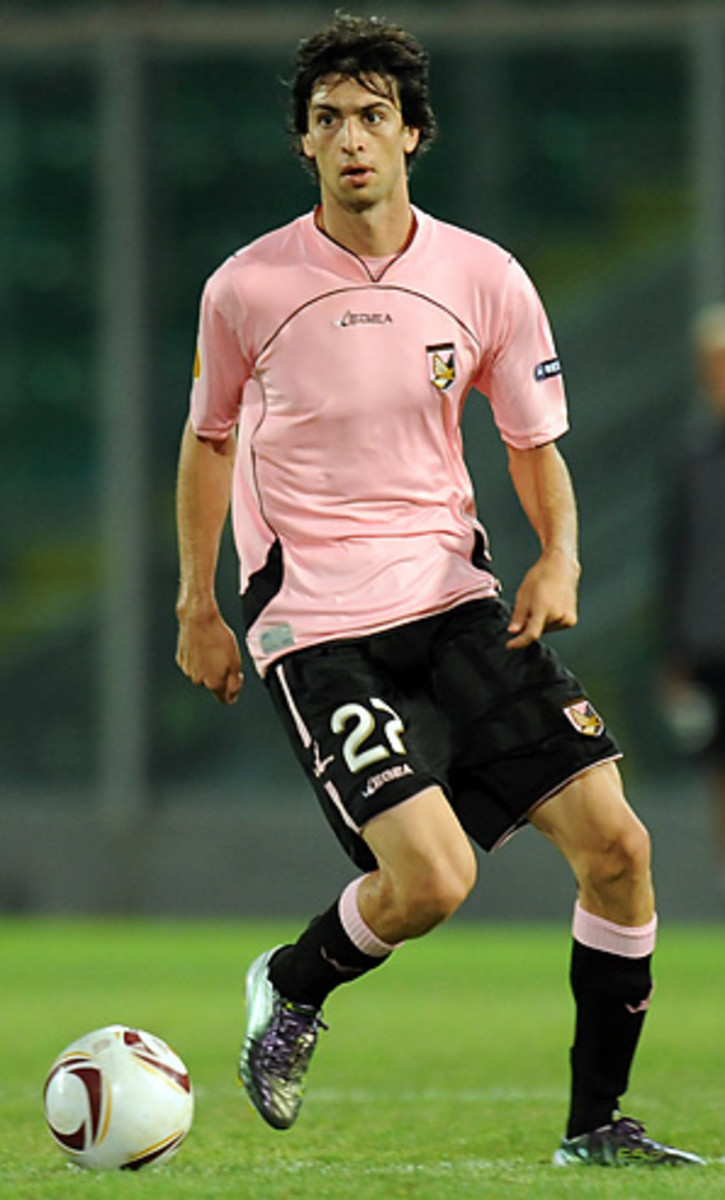Palermo's Pastoré in demand
If his agent and the selling club are to be believed, Palermo's Javier Pastoré is the market's most wanted commodity today, with the "pressure" from interested giants Real Madrid and Barcelona increasing in the hope to secure the young Argentinian's talents.
Palermo president Maurizio Zamparini said in an interview with TGS Sport that Pastore "Is my pride and joy. We are willing to reject all offers in order to retain him. He has caught the eye of all the big clubs." Zamparini fell in love with the Argentine's game and has fought for his inclusion in Palermo's squad, even changing managers when it seemed to him Pastoré was spending too long on the bench. But as the figures (approximately $50 million) touted around by the rumor mill increase, the likelihood of Palermo being able to hold onto the young player decrease.
Pastoré's story reflects Argentina's factory of young talent. He started playing in lower division Talleres de Córdoba, a club in the "interior" of the country. Most big clubs in Argentina are based in Buenos Aires, with a handful of exceptions, and Pastoré, although registered as a Talleres player in the Argentina Football Association's books (AFA) was in fact partly owned by a businessman.
Because clubs are more often than not in financial dire straits, it is common for agents and football empresarios to purchase a percentage of a player's ownership rights to recoup the investment with an eventual sale. This enables clubs to access cash. The practice is commonplace, although still frowned upon by some European Associations which continue to question what they term "third party" ownership.
In Pastoré's case, the rights were purchased by the same man who represents him as an agent, Mr. Marcelo Simonean. A loan to Buenos Aires club Huracá was arranged, and Pastoré spent two seasons there, not really playing with regularity, until Angel Cappa took over as manager. "I was struck by Javier's exquisite technique" Cappa told me recently, "and by his cheekiness and personality."
Under Cappa, Pastoré gained a regular presence on the first team starting lineup and the club achieved their best season in close to 30 years, coming second in the Apertura. With barely close to 20 games in the first Division, Javier Pastoré was sold to Italy for around $8 million, most of which ended up in his representative's pocket rather than at either club. After a very public claim, Simonean told the press he was willing to "donate" $400,000 to Huracán as a gesture of goodwill.
"The effect of these sensational international transfers has on the domestic league and the young players is devastating," says Cappa, now manager of River Plate. "A player who just starts his career and leaves ... Argentina has turned into an enormous shop window for young talents, where the only aim is to sell them. And the quality of a team is built on talented players of course, but with the continuity of those players being paramount. Here we have no continuity. Every six months about 10 players are changed. The quality of our football is from mediocre down."
Pastoré is a typically Argentine style of player: with great emphasis on technique, and with an elegance which is rare these days -- he is not every manager's cup of tea. Some labeled him as being "cold chested" -- a local expression suggesting he doesn't try visibly hard -- whereas others claim he didn't run enough. Cappa, an outspoken defender of the touching, passing, ball on the ground style of play, was enamored by Pastoré and believes he was lucky to land in Palermo, where president Zamparini saw these qualities and stood by him.
"The problem when players leave very young," Cappa said, "is that the formative process is interrupted. They haven't gained the experience necessary to develop into mature players and the move to Europe.
"Europe expects a fully formed professional to arrive. If you compare it to studying at Unversity, for example, it's like leaving in the first year of an engineering career and arriving somehwre where you're expected to build a bridge. Javier's experience in Palermo has been different because the president understood this and was able to allow him to continue his formation and develop. He has been very lucky."
Zamparini seems to echo this sentiment as he states that "If Javier was to stay with us for another couple of season's his game would improve even more."
The temptation of the huge offers allegedly on the table from giants Real Madrid and Barcelona will be hard to fend off however, and as the press goes into overdrive with speculation the agent's phones will be ringing hot throughout the ensuing days.
"Pastoré is definitely a player for Barcelona," Cappa said, "[Pep] Guardiola will now how to continue his formative process. [Jose] Mourinho I think is interested in a completely different type of football." Zamparini has also mentioned Barcelona as more suitable home for Javier, not least because of the presence of his friend Lionel Messi on the pitch.
Meanwhile, back in the streets of Córdoba, hundreds of young boys are kicking a ball around, practicing their technique and believing themselves to be the next Messi -- the next Pastoré even -- while the entire industry continues to function relying solely on the knowledge that some will be sellable before their adolescence is over.






